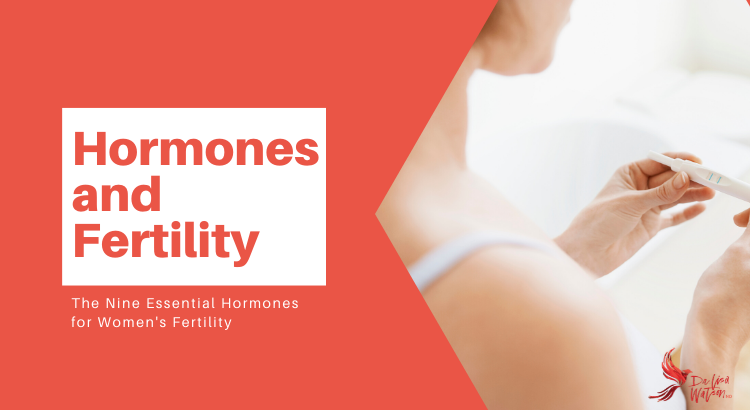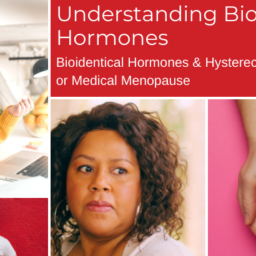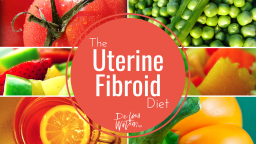
For many women the first time we really think about our hormones is when we are trying to conceive our first child. During our teens our sex education is focused exclusively on how NOT to get pregnant, and how to avoid STIs. Is there any wonder that so many women have questions on hormone balance when they decide to start a family?
This article is going to discuss the nine most important hormones involved in optimal fertility. All of these hormones can easily be tested for with your medical or naturopathic doctor.
Estrogen/ Estradiol
The quintessential female hormone, estrogen (or more correctly, estradiol – one of the main forms of estrogen) is produced in the ovaries during egg development. Small amounts are also produced in the adrenal glands and fat cells. Estrogen levels rise during the first half of our menstrual cycle, while eggs are developing. Each mature egg (follicle) can produce up to 200-300pg/ml of estradiol!
Estradiol is tested on cycle day 3 (during your period.) Estradiol levels may be low in PCOS, endurance athletes, or other conditions with abnormal egg development. High estradiol levels (>50-80pg/ml) on cycle day 3 testing may suggest a poor ovarian reserve, or suppression of FSH. This needs to be interpreted with other key hormones, especially FSH.
Progesterone
Progesterone is quite possibly the most important hormone for fertility and pregnancy. It’s name comes from “pro-gestation hormone”, which emphasizes its importance for supporting and maintaining a healthy uterine lining and future pregnancy.
Produced after ovulation, by the former follicle (now called a corpus luteum), progesterone levels are typically tested on cycle day 21. Low levels indicate that an ovulation has not likely occurred, or may be delayed. In some cases repeated progesterone testing is done to pinpoint ovulation. Elevated progesterone is often associated with pregnancy, but may also be due to congenital adrenal hyperplasia.
17-OH Progesterone
A hormone related to progesterone, this test is used to diagnose congenital adrenal hyperplasia, a condition where women have a genetic defect causing imbalances in reproductive hormones, especially androgens like testosterone. Currently research suggests around 1 in 600 women have non-classical CAH. Many women with CAH, especially the non-classical form, are initially diagnosed as having polycystic ovarian syndrome (PCOS).
If you have been diagnosed with PCOS, it is suggested that you have a test for 17-OH progesterone when trying to conceive.
Follicle stimulating hormone (FSH)
Produced in the pituitary, deep in our brains, follicle stimulating hormone does exactly what it sounds like – it stimulates the follicles in our ovaries to develop. Produced in the first half of the cycle, levels of FSH peak at ovulation, then decline.
High levels of FSH mean that the brain is trying very hard, veritably shouting at the ovaries, trying to get them to produce enough estrogen to feedback to the pituitary and lower FSH levels. As a result, high FSH levels are seen when there are issues with poor ovarian reserve, premature ovarian insufficiency, and menopause. Low levels are seen when the pituitary is not stimulating ovarian activity – such as may be seen in anorexia or with elite athletes. FSH is tested on cycle day 3, and a healthy level is typically less than 15mIU/ml.
Luteinizing hormone (LH)
Another pituitary hormone, luteinizing hormone is produced in highest levels at ovulation, and it is this hormone that ultimately triggers ovulation to occur. LH is the hormone tested for in ovulatory predictor kits (OPKs.)
Low levels of LH are seen when the pituitary is not producing adequate hormones, such as in eating disorders or elite athletes. High levels occur when the ovaries do not appropriately respond, such as in menopause or premature ovarian insufficiency.
Testosterone
Testosterone may be thought of as a male hormone, but it is just as important for women’s health and fertility. Testosterone in women can be converted into estrogen, and research has discovered that testosterone may be essential to healthy development of follicles and response to FSH.
Of course, the benefits are seen with ideal testosterone levels. In women with amenorrhea, PCOS and CAH, levels of testosterone are often much higher than expected. Testosterone levels can be tested at any time during your cycle.
DHEA
A precursor hormone to both estrogen and progesterone, most DHEA is produced by the adrenal glands. While most research on the use of DHEA involves improving IVF outcomes, supporting balanced DHEA levels may benefit any woman trying to conceive.
DHEA is most often looked at for women with diminished ovarian reserve, women of older age (older than 35 years), and women with premature ovarian insufficiency (POI). High levels may be seen in women with amenorrhea, PCOS, and CAH.
Prolactin
A hormone produced by the anterior pituitary, prolactin is best known as the hormone of lactation. Produced to stimulate and sustain breast milk production, elevated levels of prolactin can suppress healthy egg development and ovulation – a bit like Nature’s birth control – preventing a mother from having too many pregnancies close together.
Elevated prolactin can be seen in women with thyroid disease (especially hypothyroidism), anorexia, women taking antidepressants or blood pressure medications, very high stress, and polycystic ovarian syndrome (PCOS.) Very high levels may also be associated with a prolactinoma – a benign tumour that causes excess prolactin production. Prolactin can be tested at any point in your cycle.
Thyroid stimulating hormone (TSH)
The final hormone we are looking at today is not traditionally thought of as a fertility hormone, but its impact on fertility and pregnancy can not be understated.
TSH is produced by your pituitary (it’s a really important gland!) to stimulate your thyroid to make thyroid hormones. Thyroid hormones are your masters of metabolism – they determine how much energy you are able to generate and use in your daily life. For women with an underactive thyroid, their bodies are unable to generate the energy needed to support and maintain a healthy pregnancy. As a result, women with hypothyroidism may have difficulty with healthy ovulation or have issues with recurrent miscarriages.
For a woman who is trying to conceive, she needs to be aware that the ranges of TSH on lab work may not reflect her ideal range. For a woman who is trying to conceive a TSH of 1.0 to 2.5.
Additionally, women with known or suspected hypothyroidism should have their TPO (thyroid peroxidase enzymes) tested, as increases in TPO can be associated with a four-fold increased risk of miscarriage.
Working With a Naturopathic Doctor During Fertility
Fertility is a state of optimal health and balanced hormones. For women who are interested in starting a family, I suggest beginning to work with a Naturopathic Doctor early in the process. Together you can identify obstacles and areas of opportunity for an improved lifestyle and diet. Early testing and identification of hormone imbalances can also help to improve your chances for a successful pregnancy. For some women we explore more in depth functional hormone testing, to get a more complete picture of her hormone production, metabolism, and clearance. If you’re interested in discussing further, don’t hesitate to get in touch.
I’m here to help.
Selected References
Fouany MR, Sharar FI. Is there a role for DHEA supplementation in women with diminished ovarian reserve? J Assist Reprod Genet. 2013 Sep;30(9):1239-1244.
A. Sen, H. Prizant, A. Light, A. Biswas, E. Hayes, H.-J. Lee, D. Barad, N. Gleicher, S. R. Hammes. Androgens regulate ovarian follicular development by increasing follicle stimulating hormone receptor and microRNA-125b expression. Proceedings of the National Academy of Sciences, 2014; 111 (8): 3008
Reichman DE, White PC, New MI, Rosenwaks Z. Fertility in patients with congenital adrenal hyperplasia. Fertil Steril. 2014;101(2):301-309.
Disclaimer
The advice provided in this article is for informational purposes only. It is meant to augment and not replace consultation with a licensed health care provider. Consultation with a Naturopathic Doctor or other primary care provider is recommended for anyone suffering from a health problem.
















